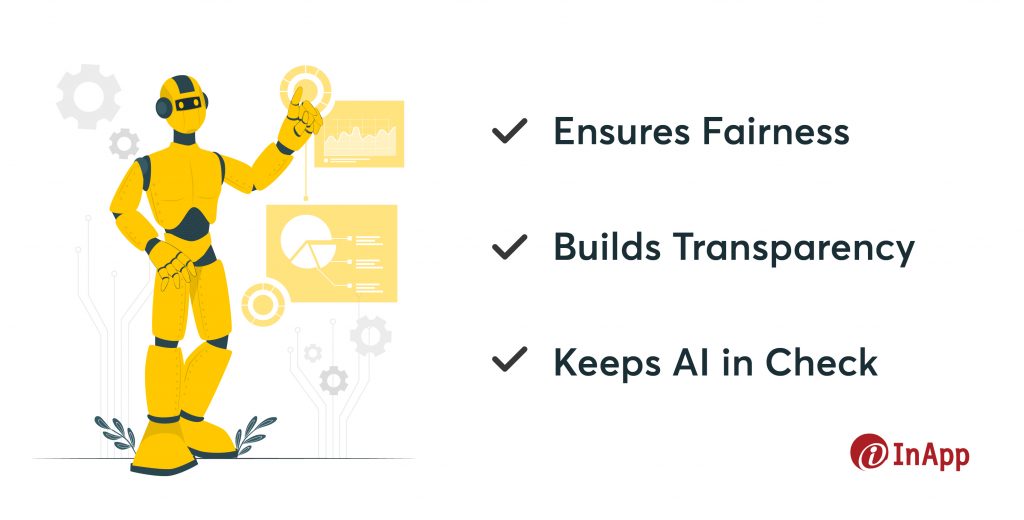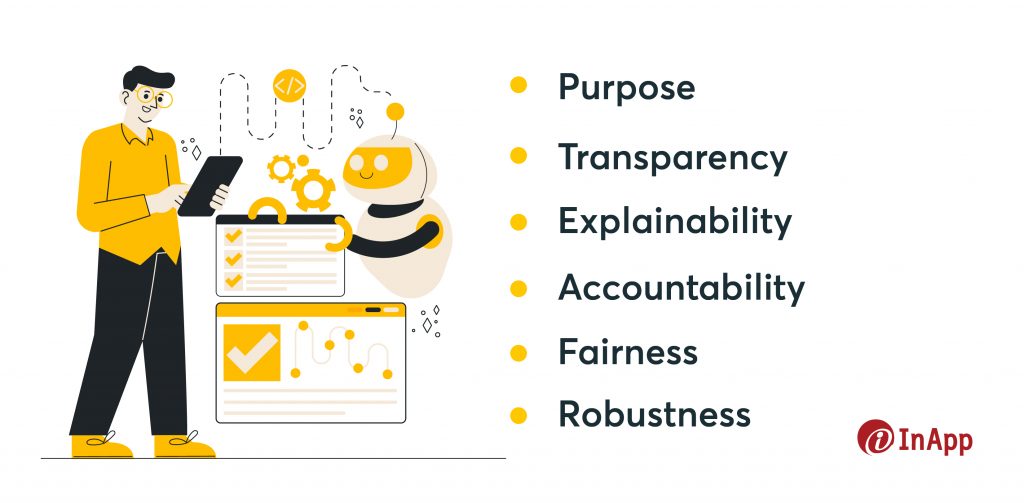AI’s rapid growth has significantly impacted diverse facets of our society, ranging from business operations to healthcare. Its integration has streamlined processes, enhanced decision-making, and even enabled personalized experiences. However, this expansion has raised ethical concerns that warrant careful consideration.
What is Responsible AI & What Are its Significance?
Responsible AI can be defined as a set of practices, processes, and development methodologies that ensure AI implementation is done ethically and with accountability. Just like how we follow rules and ethics, Responsible AI provides AI systems that do the same.
Ultimately it all boils down to making AI systems fair, transparent, and safe.
Considering the rapid proliferation of AI-enabled systems, Responsible AI carries immense significance because it’s like having a good babysitter for AI.

- Ensures Fairness
Responsible AI prevents AI systems from having biases and guarantees AI treats everyone equally. It checks and corrects biases in the data used to train AI, ensuring that AI treats everyone equally and doesn’t make unfair decisions.
- Builds Transparency
Responsible AI makes AI’s decision-making process clear and understandable. With responsible AI, end users can see how AI arrives at conclusions, which builds trust. This transparency helps us spot any mistakes or biases and makes sure AI isn’t doing things we can’t understand.
- Keeps AI in Check
Responsible AI keeps AI in check by establishing guidelines and monitoring its behavior. It involves creating rules and ethical standards to prevent AI from engaging in harmful or unethical actions. Like a vigilant guardian, responsible AI constantly observes AI systems, ensuring they operate within these predefined limits.
What are the Key Principles Guiding Responsible AI?
Responsible AI development is guided by certain principles and practical guidelines. Here are some of the ethical and operational guidelines governing artificial intelligence‘s development and implementation.

1. Purpose
AI systems should have a well-defined and socially beneficial objective that aligns with ethical values and societal goals. The principle of purpose ensures that AI is used for constructive and meaningful tasks, promoting positive outcomes for individuals and society as a whole. By establishing clear intentions for AI applications, we can prevent misuse, avoid harmful consequences, and ensure that AI technology contributes positively to various domains while respecting human values and well-being.
2. Transparency
Transparency refers to the clarity and openness of AI systems in their decision-making processes. Ideally, the inner workings of an AI system, including how it processes data and arrives at conclusions, should be understandable and explainable to the end users. Transparent AI allows users to trace how and why specific decisions were made, which builds trust and accountability. It also helps identify and rectify any biases or errors in AI systems.
3. Explainability
Explainability is a subset of transparency that focuses on making AI decisions interpretable by end users. An explainable AI system provides insights into the factors and data that influenced a particular decision, often in a way that is accessible and comprehensible to non-experts. This is crucial, especially in high-stakes applications like healthcare or finance, where understanding why AI made a particular recommendation or decision is essential for user trust and safety.
4. Accountability
Accountability in AI relates to the expectation that designers, developers, and deployers will comply with standards and legislation to ensure the proper functioning of AIs during their lifecycle. It involves clear identification of those responsible for AI systems and their decisions.
Accountability ensures that there are mechanisms in place to address any ethical, legal, or societal issues that may arise from AI’s behavior. This can include liability frameworks, ethical guidelines, and regulatory oversight. When AI systems cause harm or make questionable decisions, accountability allows for investigations, corrective actions, and, if necessary, legal consequences for those responsible.
5. Fairness
Fairness in the context of Responsible AI means that AI should not discriminate against people based on attributes such as race, gender, age, or ethnicity. Fair AI ensures that the benefits and opportunities provided by AI are accessible to everyone, regardless of their background or characteristics.
Achieving fairness involves carefully curating training data to avoid bias, using algorithms that are designed to mitigate discrimination, and continuously monitoring AI systems to detect and correct any unfair or biased behavior.
6. Robustness
Robustness refers to the ability of an AI system to operate effectively and safely under various conditions. A robust AI system can handle noisy or incomplete data, adapt to changing environments, and avoid catastrophic failures.
Robustness is essential because real-world situations are often unpredictable and can differ from the controlled conditions in which AI is trained. Robust AI systems can provide reliable performance and maintain safety even when faced with unusual or adverse circumstances.
Responsible AI is a Necessity in AI Development
In the face of AI’s rapid ascent and profound impact on our lives, it’s evident that ethical considerations are not just a theoretical concern but a practical imperative. As we conclude this exploration of ethical concerns accompanying AI’s rise, it becomes clear that addressing these concerns is essential for the responsible and sustainable development of AI technologies.
AI’s remarkable capabilities, from personalized recommendations to medical diagnostics, hold immense potential to improve our lives. However, without the ethical compass provided by principles like Responsible AI, we risk steering into turbulent waters.
As we navigate this ever-evolving landscape of AI’s influence on our world, let us carry forward the principles of Responsible AI, fostering a future where technology and humanity coexist harmoniously!
If you have any AI development requirements or need guidance on implementing Responsible AI practices, don’t hesitate to get in touch with us. Your responsible AI journey begins here.
